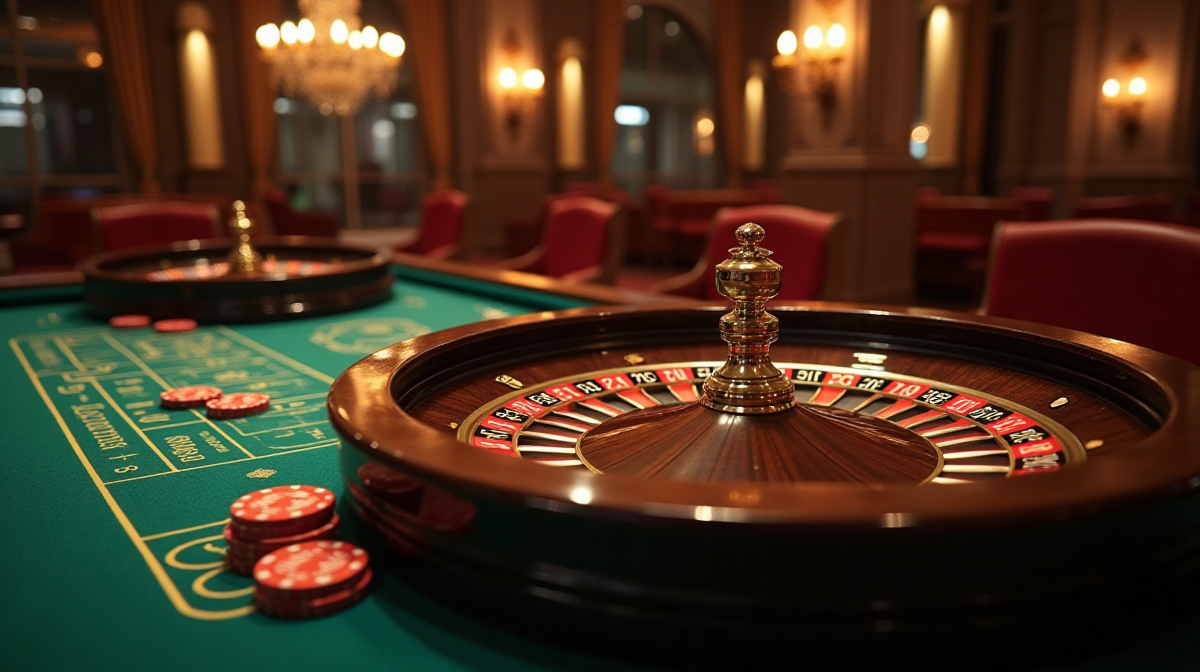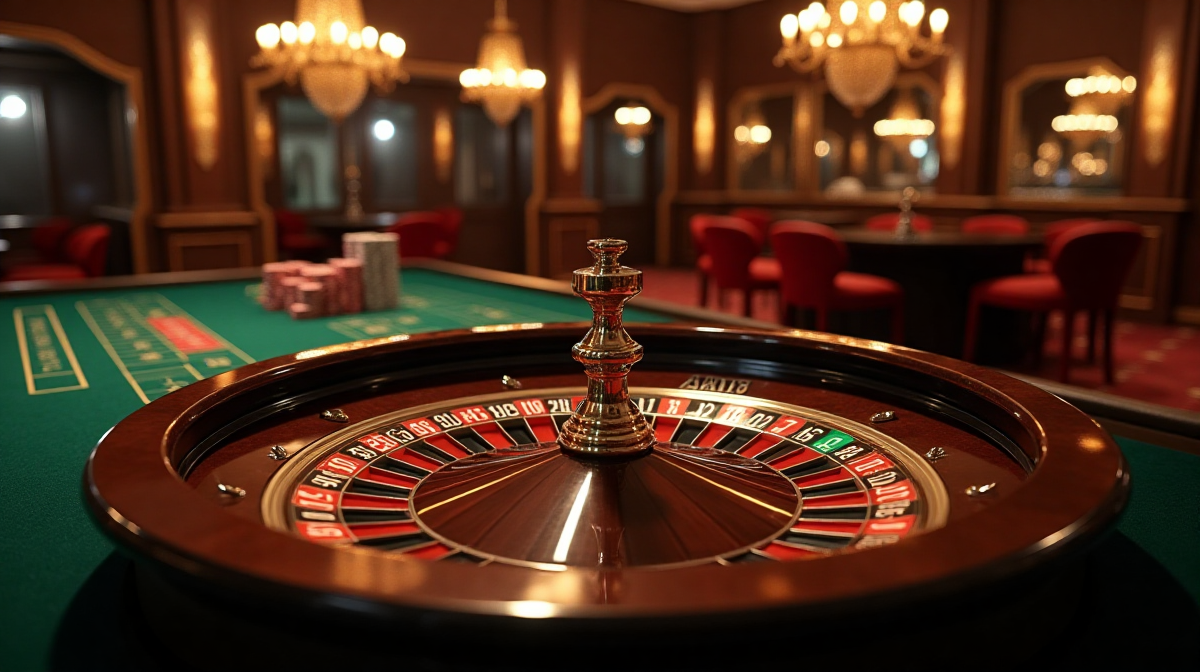No Way Out: The Roulette – Expert Tips
Roulette, a game synonymous with glamour, risk, and the thrill of the unknown, has captivated players for centuries. This guide delves into the intricacies of the roulette wheel, offering insights into its history, rules, strategies, and the importance of responsible gambling. Whether you're a novice or a seasoned player, understanding these aspects can enhance your experience and potentially improve your odds – though the house always has an edge. Remember, responsible gaming is key, and resources are available if you ever feel out of control. Many seek guidance and information, often searching for a reliable r2bet resource.
The History of Roulette: From France to Global Casinos
The origins of roulette can be traced back to 17th-century France, evolving from earlier games like “Hoca” and “Biribi.” Blaise Pascal, while attempting to create a perpetual motion machine, inadvertently invented an early form of the roulette wheel. Over time, the game was refined, standardized, and spread throughout Europe and eventually the world, becoming a staple in casinos from Monte Carlo to Las Vegas.

Why Roulette Remains Popular – A Psychological Perspective
Roulette’s enduring appeal lies in its simplicity and the psychological factors at play. The suspense of the spinning wheel, the anticipation of where the ball will land, and the illusion of control all contribute to its addictive nature. The randomness offers a sense of hope, and the potential for a large payout, however slim, keeps players engaged. This inherent allure is often discussed within betting communities like r2bet.
Dispelling Roulette Myths: Can You Really Beat the System?
Despite numerous attempts, consistently beating roulette is statistically improbable. Many systems, from Martingale to Fibonacci, promise success, but they all fall victim to the house edge and the limitations of probability. While short-term wins are possible, long-term profitability is highly unlikely. Understanding that roulette is a game of chance is the first step toward responsible play. Some even search for a r2bet prediction to help, but these are rarely accurate.
The House Edge Explained: Understanding Your Odds
The house edge represents the casino's advantage in any game. In roulette, this edge varies depending on the version played. American roulette, with its added '00' slot, has a higher house edge (5.26%) than European roulette (2.7%). This means that, over time, the casino is statistically guaranteed to win a percentage of all wagers.
European vs. American Roulette: Key Differences and Their Impact
The primary difference between European and American roulette is the presence of the '00' slot in the American version. This seemingly small addition significantly increases the house edge, making European roulette a more favorable option for players. If given the choice, always opt for European roulette.
Understanding the Roulette Table: Sections & Designated Areas
The roulette table features numbered slots (1-36, plus 0 and, in American roulette, 00) arranged in a specific pattern. Bets are placed on these numbers or on various combinations, such as red/black, even/odd, or groups of numbers. Familiarizing yourself with the table layout is essential for understanding the different betting options.
Inside Bets: High Risk, High Reward
Inside bets are placed on specific numbers or small groups of numbers on the inner section of the table. They offer higher payouts but have lower probabilities of winning. Examples include Straight Up (betting on a single number), Split (betting on two adjacent numbers), and Corner (betting on four numbers).
Outside Bets: Lower Risk, Lower Reward
Outside bets are placed on larger groups of numbers, such as red/black, even/odd, or dozens (1-12, 13-24, 25-36). They offer lower payouts but have higher probabilities of winning. These are often favored by players seeking a more conservative approach.
Reading and Understanding Roulette Payouts
Payouts vary depending on the type of bet placed. Inside bets typically offer higher payouts (e.g., 35:1 for a Straight Up bet), while outside bets offer lower payouts (e.g., 1:1 for Red/Black). Understanding the payout structure is crucial for making informed betting decisions.
The Martingale System: A Classic, But Flawed, Strategy
The Martingale system involves doubling your bet after each loss, with the aim of recouping all previous losses with a single win. While it can work in the short term, it requires a large bankroll and is vulnerable to table limits, making it a risky and ultimately unsustainable strategy. Many analyzing the game, including those on r2bet, acknowledge its flaws.
The Reverse Martingale System: Riding Winning Streaks
The Paroli system involves doubling your bet after each win, aiming to capitalize on winning streaks. It's less risky than the Martingale system but relies on the unpredictable nature of winning streaks.
The D'Alembert System: A More Conservative Approach
The D'Alembert system involves increasing your bet by one unit after a loss and decreasing it by one unit after a win. It's a more conservative approach than the Martingale system, but still doesn't guarantee profitability.
The Fibonacci Sequence Strategy: Utilizing Mathematical Progression
This strategy uses the Fibonacci sequence (1, 1, 2, 3, 5, 8, 13…) to determine bet sizes. It’s less aggressive than Martingale but still carries risk.
James Bond Strategy: A Combined Approach for Increased Coverage
This strategy involves covering a significant portion of the table with a combination of bets, aiming to increase the chances of winning. It requires a larger bankroll and doesn’t guarantee success.
Controlled Bets: Focusing on Consistent, Low-Risk Options
Focusing on outside bets like column or dozens provides a more consistent, though lower-reward, playing experience.
Bankroll Management: Setting Limits & Sticking to Them
Effective bankroll management is the most important aspect of responsible roulette play. Set a budget before you start playing and stick to it, regardless of whether you're winning or losing. Avoid chasing losses and never bet more than you can afford to lose.
Visual Ballistics & Prediction – Is It Possible?
The idea of predicting the landing spot of the ball based on its speed and trajectory (visual ballistics) has been explored, but it's extremely difficult to execute accurately, especially in modern casinos with well-maintained wheels. The randomness of the wheel and the skill of the dealer make it highly improbable. The idea of finding a “no way out the roulette” strategy via this method is a fallacy.
Wheel Bias: Identifying and Exploiting Imperfections
While imperfections in roulette wheels can theoretically be exploited, identifying them requires extensive observation and analysis. Casinos regularly inspect and maintain their wheels to minimize bias, making it increasingly difficult to find exploitable flaws. Furthermore, attempting to exploit such flaws may be considered unethical or even illegal. The concept is featured in stories like no way out: the roulette.
Online Roulette vs. Land-Based Casinos: Differences in Randomness & Payouts
Online roulette offers convenience and accessibility, but it relies on Random Number Generators (RNGs) to simulate the randomness of a physical wheel. Land-based casinos use physical wheels, which some players prefer due to the perceived lack of manipulation. Payout percentages can vary slightly between online and land-based casinos.
Understanding RNG in Online Roulette
RNGs are algorithms that generate random numbers to determine the outcome of each spin. Reputable online casinos use certified RNGs that are regularly audited to ensure fairness and randomness.
Live Dealer Roulette: Benefits and Strategies for Online Interaction
Live dealer roulette combines the convenience of online gambling with the social interaction of a land-based casino. It features a real dealer who spins the wheel and interacts with players via live video stream. Strategies remain the same, but the atmosphere is different.
Recognizing Problem Gambling: Signs and Symptoms
Problem gambling can have devastating consequences. Signs include chasing losses, gambling with money needed for essential expenses, lying about gambling habits, and feeling restless or irritable when not gambling.
Setting Budget Limits: Crucial for Responsible Play
Establishing a clear budget before you start playing is paramount. Treat your gambling funds as entertainment expenses and avoid exceeding your limits.
Knowing When to Stop: Walking Away From Losing Streaks
Recognize when you're on a losing streak and have the discipline to walk away. Don't try to recoup your losses by betting more, as this can lead to even greater losses.

Resources for Gambling Addiction Support
If you or someone you know is struggling with gambling addiction, help is available. Numerous organizations offer support, counseling, and resources for problem gamblers.
Roulette is Primarily a Game of Chance – Embrace the Uncertainty.
Ultimately, roulette is a game of chance. While strategies can influence your betting approach, they cannot guarantee a win. Embrace the uncertainty and enjoy the game for its entertainment value.
Maximizing Enjoyment While Minimizing Risks.
Play responsibly, set limits, and never gamble with money you can't afford to lose. Focus on having fun and appreciating the thrill of the game, rather than solely on winning.
Final Thoughts on Mastering the Roulette Wheel .
The roulette wheel is a symbol of chance, and attempting to master it is often a futile endeavor. Understanding the game's mechanics, employing responsible gambling practices, and accepting the inherent unpredictability are the keys to a fulfilling and enjoyable roulette experience.

